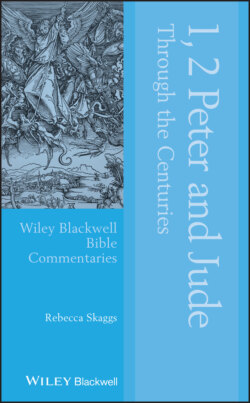Читать книгу 1, 2 Peter and Jude Through the Centuries - Rebecca Skaggs - Страница 47
The Transformed Life: Three Metaphors (1:24 – 2:10) The Grass Metaphor (1:24, 25) Overview
ОглавлениеThis section is composed of three metaphors describing the transformed life: grass, milk, and living stones. They convey the dynamic quality of the life brought about by new life in Christ. Although two of them are in chapter 2 of 1 Peter, together they create a coherent message about the transformed life, vividly illustrating complementary qualities of this existence.
Many of the ancient writers liked Peter’s use of the grass metaphor of Isaiah 40: 6–8. For example, Eusebius of Caesarea (c.260–340) comments, “Like the grass of the field and like beautiful flowers he [man] will soon wither and die” (Catena, CEC 49: my tr.). Theodoret of Cyr expands it somewhat, allegorically: “But just as when the grass withers, the flowers fall off, so when men die, their pride and glory are extinguished” (Catena, CEC 49–50L my tr.). Hilary of Arles adds another perspective, that the human being has two sides: the outer person is mortal like the flower of the field and will pass away, but the inner person lives forever by God’s power (Intro. Comm. on 1 Peter, PLSupp).
This metaphor has some notable effects in culture as well. For example, in 1760, Anne Steele was inspired by 1 Peter 1:24 to write a poem entitled “Life is a span, a fleeting hour.” Steele captures the sense of the transience of life, seen through the lens of hope conveyed in the passage of Peter. She had certainly experienced suffering in an extraordinary way: she lost her mother at the age of three, became an invalid following an accident when she was 19, and finally her fiancé drowned on the day of their wedding. Hope still characterized her life and she cheerfully assisted her father in ministry for the rest of her life. Her poem was set to music in 1875 by John B. Dykes and is still popular, being included in 159 hymnals.
Life is a span, a fleeting hour;
How soon the vapour flies!
Man is a tender transient, flow’r,
That e’en in blooming dies.
The once‐lov’d form, now cold and dead,
Each mournful thought employs;
And nature weeps her comforts fled,
And wither’d all her joys.
But wait the interposing gloom,
And lo! stern winter flies;
And, dress’d in beauty’s fairest bloom,
The flow’ry tribes arise.
Hope looks beyond the bounds of time,
When what we now deplore
Shall rise in full immortal prime
And bloom to fade no more.
Then cease, fond nature! cease thy tears;
Religion points on high:
There everlasting spring appears,
And joys that cannot die.
(hymnary.org)
Johannes Brahms (1833–1897) based the second movement of his Requiem, “Denn alles Fleisch, es ist wie Gras” (translation: “For all Flesh is as Grass”), on this metaphor and cited 1 Peter 1:24, even though the same metaphor is in Isaiah 40: 6–8. As is customary for German requiems, it is scored for full symphony, including strings and harp, woodwinds, brass, and timpani accompanied by full chorus. Interestingly, the beginning of the movement is used in the opening credits of the BBC documentary film series The Nazis: A Warning from History, and segments are repeated during the closing credits. Clearly this is a radical shift from the meaning of the text of 1 Peter, but is another example of material from 1 Peter being used without the knowledge of its connection to the text of 1 Peter.
